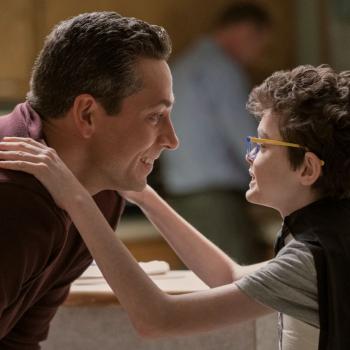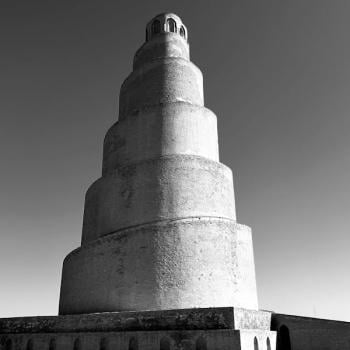Editors' Note: This article is part of a Public Square conversation on Billy Graham's life and legacy. Read other perspectives here.
I did not become a Christian at a Billy Graham Crusade. But my mother did. Sort of.
In the summer of 1965, my mom was wrestling with God when she made a bargain with the Almighty. She had about had it with my older brother, who was not an untypical late teen in the 1960s—you get the picture. After one shouting match that culminated with much drama and slammed doors, my mom desperately prayed, "God, if you will get my son into the army, I'll accept Jesus."
My brother returned home in a few hours and announced that he had joined the Air Force.
My mother, not one to quibble about details, assumed a deal was a deal. So the next time a crusade was featured on the local affiliate (we got all of three channels), she sat before our little black and white TV, listening to the evangelist preach. At the altar call, Graham (as was his custom) turned directly to the television camera and said, "If you at home would like to receive Jesus Christ tonight, kneel before your television set, and pray this prayer with me..."
And my mom did. Right there, in front of God and everybody, she prayed the sinner's prayer.
When my mom latched onto something, we all did, whether we wanted to or not. (Except for my dad, who was inoculated against her enthusiasms.) So off to church we went, my younger brother and me, my cousin (who was living with us at the time), and my mom, all packed into her 1958 white Thunderbird.
When the preacher suggested one Sunday that Christians should regularly study their Bibles at home, my mom (who had not been raised in the church) had no idea that this was the sort of things preachers say and that congregations (guiltily) ignore. Instead, she soon announced that we would start having Bible studies around the table after dinner. So that's where we found ourselves, most nights of the week, four biblical ignoramuses trying to make heads and tails of John's Gospel, one of the most difficult books of the Bible, with my chain-smoking, coffee-gulping former alcoholic mom leading us.
All this can have an effect on a junior high boy who didn't have a rebellious bone in his body (yet). It wasn't long before I found myself walking the aisle of the Evangelical Free Church of Felton, California, kneeling at a metal chair, blurting out the sinner's prayer through sobs, with the reassuring arm of a church elder gently resting on my shoulders.
To fast forward through the rest of my uninteresting life: I became active in my high school youth group and college, married a fellow believer, entered Fuller Theological Seminary, became an ordained pastor in the Presbyterian church, and then became associate editor at Leadership journal, and then managing editor and now editor of its older sister publication, Christianity Today.
My conversion has of course shaped every decision large or small, and every relationship intimate or formal. It has influenced what I read and write and why, how I think, and how I pray. It has deeply formed my personality and my professional life. And since day after day I have failed to live faithfully to the high calling of Christ, I have every day of my life relied on his mercy. Such continued failure and repeated forgiveness forms a person deeply. So that's one life very much shaped, at least indirectly, by the ministry of Billy Graham.
But then there is this: Billy Graham was the founder of Christianity Today, so it's not too much to say that without Graham, there would be no working at Leadership and then Christianity Today. It's not exactly accurate to put it this way, but it sure feels like it some days: Billy got me this job in journalism, which has been my livelihood for nearly a quarter of a century, two-thirds of my working life.
So my life is a bit unusual in respect to Graham's influence. But take away the job, and the statement stands, for me and for all those who have been touched directly or indirectly by Graham. The real legacy of Billy Graham is not measured in millions of decisions or by the power of the people he spoke with. It's appreciated better in snapshots: of four neophytes in a smoke-filled room poring over the Bible, of a young man walking the aisle, of teenagers bowed in prayer before they embark on a missions trip, of married couples learning to love one another in Christ, of parents wrestling over what it means to raise up children in the Lord, of a young doctor in an AIDS hospice in Africa offering to pray with a patient, of an old man greeting the day with a prayer for forgiveness as he gives himself afresh to the Savior and Lord he gave himself to in that little church so long ago.
This is an influence that can't be counted, measured, or made into any sort of metric. But it is lived and felt, all across the planet, one person at a time.
11/12/2013 5:00:00 AM




